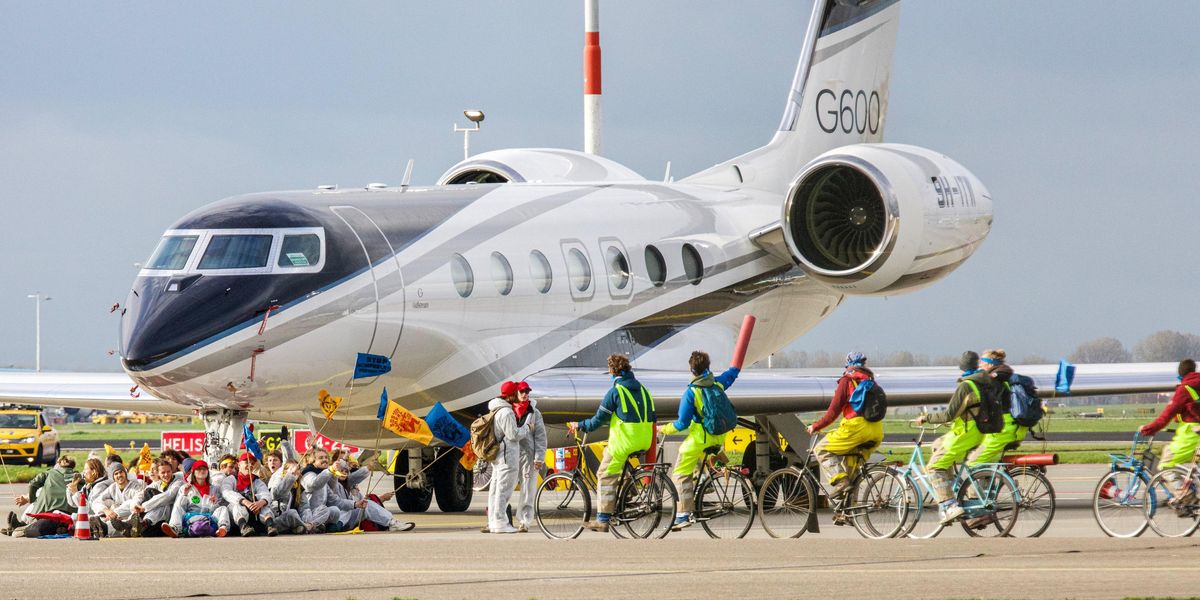
The past two years have been a bonanza for private aviation.
The drastic increase in demand has led to flight delays, increased costs, and pilot shortages. But the slow deterioration of working conditions for aerospace labor has not stopped the jet-owning oligarchy from flying more than ever. Their increased share of air traffic has a direct impact on inequality and has dire consequences for the climate.
The High Flyers 2023 report from the Institute for Policy Studies demonstrates how the boom in private aviation has a disproportionate negative effect on our environment while private jet owners continue to pay less in taxes than commercial air passengers.
The private jet industry—well aware of the climate criticisms launched their way—has attempted to change the narrative by claiming that they are on the cutting-edge of developing sustainable technology that will green aviation. However, private investment in sustainable aviation fuels, or SAFs, is currently limited and does not make up significant share of the jet fuel market. Low-carbon SAFs need significant government financing to become a viable alternative to conventional jet fuel.
Our solution to mitigate the negative climate impact of private aviation is to disincentivize its use, especially if an alternative mode of transportation is already available. We can accomplish this by increasing existing duties on jet fuels and establishing new taxes on short-haul flights and the sale of new and preowned aircraft. The revenue raised could be dedicated to a fund that would then be invested in greening aviation, thereby reducing carbon emissions, and building new sustainable transportation equity projects.
The findings of our report include the following:
- The median net worth of a full and fractional private jet owner is $190 million and $140 million, respectively. This demonstrates that the jet-owning oligarchy—whose typical profile are men over the age of 50—represent a very small portion of the global population. Any taxes levied on the high flyers will not affect 99.9 percent of the population.
- Private jets emit at least 10 times more pollutants than commercial planes per passenger. The disproportionate carbon footprint of the ultra-wealthy is accelerating our climate breakdown and it highlights the need to curb such travel and invest in sustainability.
- The private jet sector set industry records with regards to transaction and dollar volume in 2021 and 2022. And it is a sector that is expected to continue to steadily grow over the next few years. Preowned transactions dominated, and it highlights the importance of applying luxury taxes on both used and new jets, especially since older aircraft tend to be less fuel efficient.
- A 10 percent and 5 percent transfer fee on preowned and new private aircraft would have raised $2.4 billion in 2021 and $2.6 billion in 2022. The current size of the private jet market is $34.1 billion and it is forecasted to reach $39.9 billion by 2025. The state is leaving significant amount of money on the table by failing to levy a luxury transfer tax on private jet sales.
- Thousands of municipal airports in the US are funded by the public, but many primarily serve private and corporate jets. Our vast network of general aviation airports does not offer services to commercial airliners and passengers. Yet they are frequently utilized by the jet-owning oligarchy despite being supported by our tax dollars.
- The wealthy can transfer ownership of their jets to a private trust, obscuring the true ownership of the aircraft. The ability to conceal the identity of a private jet owner comes with potential security risks, and it contrasts with the security protocols commercial passengers must experience at airports.
The United States and other countries with large markets for private jets are squandering a golden opportunity. By not applying our recommended taxes, we are failing to invest in green transport infrastructure. The collective action workers and activists are needed to put public pressure on our elected representatives to curtail private aviation, collect on the billions of tax revenue left on the table, and invest in a more sustainable future.
This content originally appeared on Common Dreams and was authored by Omar Ocampo.